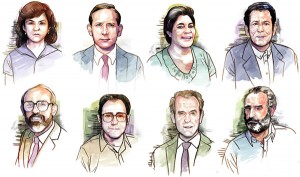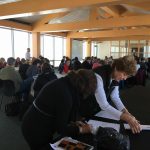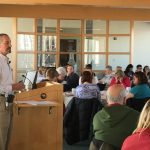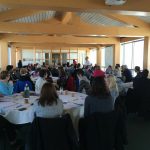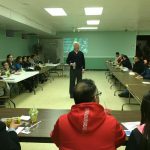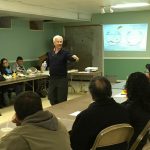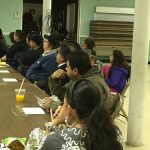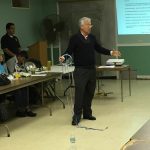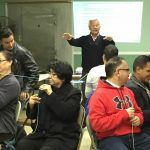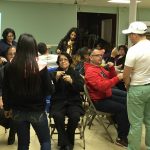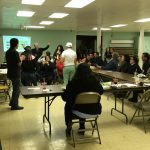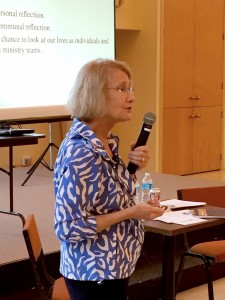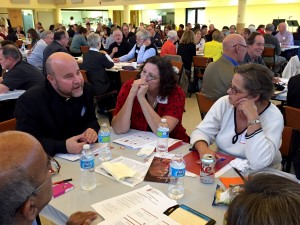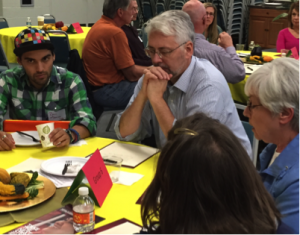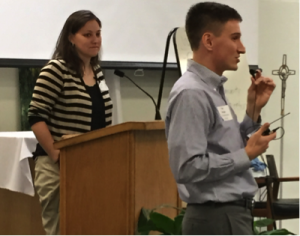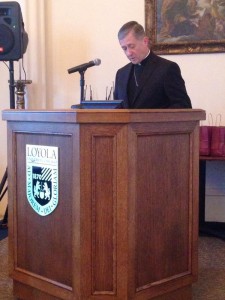
Opening Remarks
Archbishop Blase J. Cupich
Loyola University Chicago
Institute of Pastoral Studies Event
February 10, 2015
“Thank you Loyola University, Fr. Garanzini, Dr. Brian Schmisek and all those who were instrumental in developing a Master of Arts in Pastoral Studies with a concentration in Digital Communication. Thank you also for inviting me to give opening remarks before this distinguished panel, moderated by Don Wycliff, shares with you their expertise and insights on the Church’s use of social media.
This initiative which the Institute of Pastoral Studies is launching will provide participants with the communications tools, instructions and knowledge necessary to address a variety of current parish needs and to look and plan for future needs. Students will learn how to build not only the appropriate infrastructure but to develop the message, the delivery, and utilize the resulting interaction in parish life, all of which is exciting and necessary to the growth of our parishes and the spread of the Gospel.
It occurs to me that as you do so it is worth recalling something St. John Paul II writes in his 1990 encyclical, Redemptoris Missio. The means of mass communication, he noted, have become not only the chief means of information and education for many people today, but also the chief source for “guidance and inspiration in their behavior as individuals, families and within society at large.” For this reason, he went on to say: “It is not enough to use the media simply to spread the Christian message and the Church’s authentic teaching. It is also necessary to integrate that message into the ‘new culture’ created by modern communications. This is a complex issue, since the ‘new culture’ originates not just from whatever content is eventually expressed, but from the very fact that there exist new ways of communicating, with new languages, new techniques and a new psychology” (John Paul II, Redemptoris Missio, 37c, 1990).
This trenchant analysis is all the more remarkable when we consider that these words were written before the Internet became part of all our lives, yet they seem to describe its influence but also its challenges and opportunities for society and the Church so startlingly well. What the late saintly pope is saying here is that developments in communications technology going back well over a hundred years have not only benefited us but have also changed us. That is why the Church’s interest in and concern for contemporary communications technology is not merely a utilitarian concern – a form of “keeping up with the Jones” to make sure that the Church is not still using quill pens, as it were, when everyone else is text messaging. There are deeper issues that go beyond the surface attractions that claim our attention. These new communications technologies have created a new culture, and the Gospel message cannot be effectively communicated without the Church’s immersing herself in and understanding this culture.
The novelty of the Holy Father’s opening Twitter and Facebook accounts, and even engaging viewers with Google Hangouts may make headlines for a couple of days. Less likely to get serious consideration is what opening those accounts and hanging out on Google says about the nature of the culture which the Holy Father is trying to reach and even about the impact such communications have on the nature of the Church in using these means.
To put in perspective this point that contemporary communications technology has impacted us, changed our culture, changed us, just consider how other scientific and technological advances have also changed us, changed the way we think and behave. For instance, the invention of the microscope confirmed the existence of invisible organisms which explain the once mysterious phenomena of disease and epidemics. This was not only new knowledge but a new way of relating to our world. We now had a more accurate understanding of our environment. No longer were we at the mercy of superstitious explanations which could not free us from these diseases and epidemics. Instead of being crushed in spirit and body as our medieval ancestors were by the Black Death, we can fight against epidemics as we have had to do most recently against Ebola in West Africa.
Likewise, we have seen a change in us, our culture and our behaviors in a number of ways when it comes to the technological developments in mass media. Just to list a few:
- Social networking sites provide connections between people with an ease unimaginablebefore;
- The ordinary person has been empowered to be his or her own publisher, reporter, magazineeditor, or movie/TV director/producer whose products can reach multitudes and offer thepotential to gain the attention of the major conventional media and even transcend them;
- An Internet sensation can soon become a public sensation;
- The Internet even offers the potential to assume a wholly other persona in the world of the“’Net.” A New Yorker cartoon brings this point home well. One dog says to another, “On theInternet, nobody knows you’re a dog”;
- Work space and play space interpenetrate as persons can work almost anywhere as if theywere at their desks and have with them on their smartphones video programming, music andwhatever else it is that entertains them.
- We do our shopping and banking without ever leaving our homes;
- Search engines take the place of traveling to libraries and archives.
This extraordinary democratization of media has certainly brought about a “new culture … with new languages, new techniques and a new psychology.” Even socio-economic and generational differences are marked by the challenges that come from these new technologies. The access to these means, which still demand a certain level of resources or the lack of access, has exacerbated social differences and inequality. The ease with which these new technologies are used by those who have grown up with them at their fingertips(or voice commands) make many in the older generation feel left out, especially when the conventional media they are used to refer them to the Internet for further information.So, the Church and Church leadership must give careful consideration to the enormous consequences new communications technology will have on them. It is not sufficient to join in the surprise with every new development nor simply try to keep up with the times by investing in whatever the marketplace rolls out. We have to begin thinking about the deeper issues, how these technologies are changing us, changing our culture and how we intersect with that culture in carrying out the mission of Christ.
My hope would be that today and the days going forward you will keep before you both the challenges and the opportunities this new technology presents for pastoral life. To get you started let me offer a couple of considerations.
It might be appealing at first blush to become enamored by the Internet’s ability to provide top- down communication, only to learn later that many of its users expect more. Interactivity is part of the Internet beast’s nature. Yet, this is more revolutionary for the Church than the simple statement of fact makes it sound. After all, the Catholic Church has a hierarchy with authority to teach, govern and sanctify. The most significant communications have been from the top down. Even the Second Vatican Council was a revolution from above, a fact often ignored. The Internet has the potential, or for some, the risk, of opening the decisions of all hierarchies to debate from below. How does an authoritative teaching office not only communicate but also make its decisions stick, as it were, in an Internet world that encourages discussion and debate of everything? What are the consequences for geographically-based authority, such as diocesan bishops, in a world where the media know no such boundaries or of having so many blogging bishops when speaking with one voice has been a hallmark of Catholicism? As a friend of mine says, Pope Francis’s openness to the media may have to result in a new category of papal pronouncement: the Apostolic Interview.
Also do these new media help or hinder the creation of genuine community? The experience so far is ambiguous. These technologies do facilitate a sense of community with a reach that can be truly “catholic,” at least with a small “c,” but they also make possible communities that are exclusive and not universal – communities which simply re-enforce one’s own world view to the exclusion of any other. They also can foster isolation, providing the individual with the capacity to avoid face-to-face contact with other human beings. This is hardly conducive to participating in a Church which calls its diverse members to contribute to the building up of one body, each in his or her own way. Nor can we ignore the persistence of inequality of access present in the so called “digital divide”, in which the poor, underserved communities lack the means to access the internet the way the rest of us do and take for granted. All of this cuts against the Church’s mission and goal of offering a Pentecost experience of the universal proclamation of the Gospel in a way all can understand.
And, finally to take a very down-to-earth, even mundane example of the ambiguities the new technology can present: There is no more utilitarian task than raising the money that permits the Church to carry on her pastoral ministries. The new communication technology makes possible on-line giving, but as one pastor I know recently asked me: “what kind of message we are sending by promoting a way of contributing which makes it possible to support the Church without ever going to church?”
The Church’s concern for the mass media for as long as she has been aware of their influence has involved not only their potential benefit (or risks) to the Church but also their effect on the entire human community. In discussing the negative consequences of new communications technology, sometimes they are treated as if they arose solely from the “newness” of the technology. But, this fails to recognize that, just as these new means are a response to the basic human need to communicate, so too their defects reflect defects of human nature. The capacity culpably to mislead and to permit oneself to be misled was apparent even when humanity’s means of communication were far more primitive.
Unquestionably technology can exacerbate the impact of humanity’s defects. The unmediated and easily manipulated form of media that is the Internet poses the problem of an exceptionally efficient, widespread and anonymous dispersal of lies and misinformation and of indecency and predatory activity. But a computer is not a magic box that makes people do evil. What it does do is increase our capacity to do good or evil as we choose. Unfortunately, like developments in weaponry, developments in the means of communications can outstrip the ability of humanity’s ethical sense to come up with the principles and ways to guide their use. The Church has the responsibility to promote the ethical use of all media, old and new.
Addressing these serious questions and deeper issues seems to me to be at the heart of the new effort Loyola University’s Institute of Pastoral Studies is launching today. This very comprehensive program will offer students technical communications tools and the infrastructure for message development, delivery and interaction all of which has the promise of enriching and enhancing the spread of the Gospel. But at the same time, my invitation to you is that you also attend to the deeper issues which are related to how this new technology is changing us, our behaviors and our culture; that you will explore ways for the Church to intersect that culture, but also integrate the Christian message into the ‘new culture’, as St. John Paul II urged a quarter century ago. The aim of your studies will be as it always has been: to bring people in our time to an encounter with Christ, making them not only disciples but companions who will accompany each other, not merely as Facebook pals, bloggers or tweeters, but as fellow pilgrims. Thank you.”
Join the conversation by following @BrianSchmisek on Twitter and @LoyolaIPS on Instagram! Also, network with the Loyola Chicago IPS community on LinkedIn.

